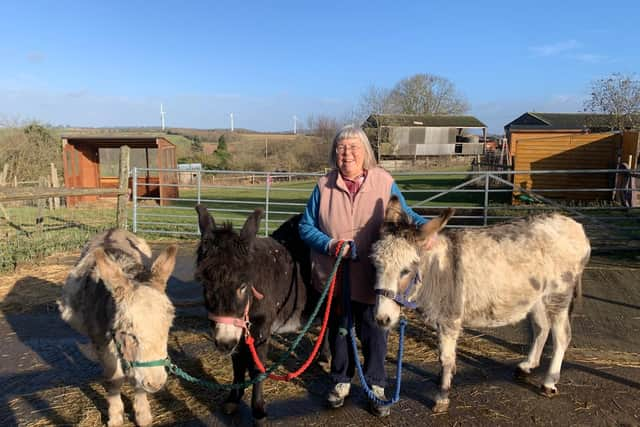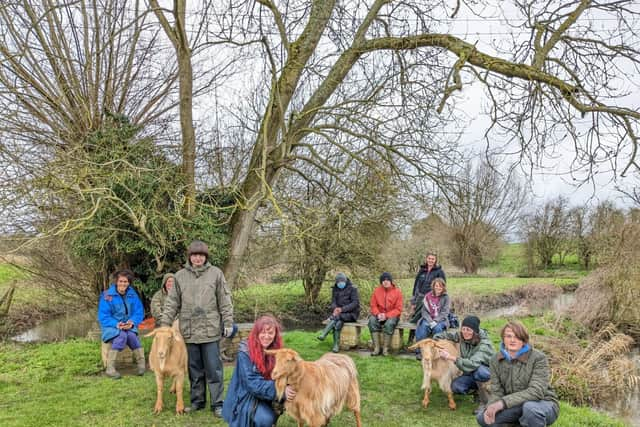MBE for Oxfordshire farmer who works with autistic young people
and live on Freeview channel 276
Since the late 1990s, Lydia Otter has been inviting young people who are neurodivergent onto her family farm in Oxfordshire with the belief that visiting and working on the farm could be widely beneficial to them.
Nowadays, Pennyhooks Farm welcomes 35 children and young adults with autism every week so they can learn and develop social and working skills and Lydia has just been awarded an MBE after many years of providing such a valuable service.
Advertisement
Hide AdAdvertisement
Hide AdLydia, who farms in Shrivenham and is a Vale and Wallingford NFU member, said: “When I learnt that I was being awarded an MBE, I was astonished and just so surprised.


“I am so grateful for the recognition that the work we do here at Pennyhooks has proven to be of value.
“It’s also a wonderful way to acknowledge all the people who have helped over the years as well.
“I feel that the MBE is for everybody who has ever helped us because we would never have got off the ground or been able to continue without them.”
Advertisement
Hide AdAdvertisement
Hide AdLydia originally worked as a teacher within the Oxfordshire Autism Service where her Head Teacher asked her to arrange trips for the autistic students to visit her family’s organic beef farm as it was hoped that the students would find the environment helpful.


She said: “I was brought up on the farm and I was so comfortable there with all the daily and seasonal rhythms, but when I went away to boarding school, I felt so disconnected from nature that I would go out and stand beneath some trees and look up just to reconnect with the seasons.
“When training to be a teacher, observing musical therapy, I remember one instance where the therapist played a rhythm to a non-verbal child with autism and he replied with a rhythm identical to one I would have responded with.
“Here was somebody without language and unusual body movements but he actually showed that, beyond doubt, he was functioning within and just had to have help to function outside.
Advertisement
Hide AdAdvertisement
Hide Ad“That’s what made me think about the farm with its practical jobs, such as pushing wheelbarrows and bales – we could get students involved in things they could physically do and also hopefully they would feel the benefits of being outside in nature.”
After returning to Pennyhooks full-time to help her father, Geoffrey Otter, Lydia turned her school visits into a more permanent service in order to enable autistic school leavers to continue their development in a supportive farm-based environment.
Many generous grants over the years have helped her develop the farm with the addition of more animals, a greenhouse and several new buildings where students develop their work skills including animal care, conservation, horticulture, woodwork, rural crafts and home skills.
The students at Pennyhooks range in age from 19 to those in their 40s as many have continued to come to the farm since Lydia first started welcoming autistic people, creating a mutually supportive community – older students help the new ones learn about life on the farm.
Advertisement
Hide AdAdvertisement
Hide AdLydia said: “It’s just been constant growth really, it’s quite extraordinary to be part of.
“One thing about the farm is that I can control what happens on it and therefore I can enable the farm to support the students and not have it worry, frighten or be too noisy for them.
“These young people aren’t really expected to be able to have a working ethos or to want to help, but the great thing is that they have proven beyond doubt that they really do want to.
“There’s a really good sense that the farm is a setting where they can not only take part but they can succeed and achieve and really make a difference.
Advertisement
Hide AdAdvertisement
Hide Ad“Some of the land on our little farm is in a high level environmental scheme (higher level stewardship) and we’ve got important water meadows, archaeology and botany. We now have a wonderful circle of care; the farm is caring for the students and the students are caring for the farm.
“There really is a sense of achievement here, stemming from the mutual benefit that is happening between the students and the farm.”